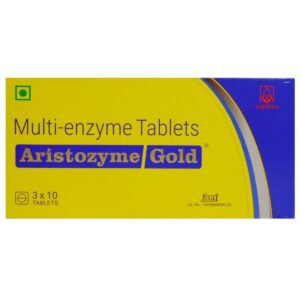SIMETHICONE + PEPSIN + FUNGAL DIASTASE
Simethicone: Simethicone is an over-the-counter medication commonly used to relieve symptoms of excessive gas in the gastrointestinal tract. It is available in various forms such as chewable tablets, capsules, and liquid suspensions.
The mechanism of action of Simethicone involves reducing the surface tension of gas bubbles in the stomach and intestines. This allows the gas bubbles to combine and form larger bubbles, making them easier to pass through the digestive system and alleviate symptoms such as bloating, belching, and flatulence.
The recommended dose of Simethicone varies depending on the formulation and brand. Generally, for adults and children above 12 years of age, the usual dose is 40-125 mg taken 4 times a day after meals and at bedtime. However, individual dosing instructions may differ, so it is important to follow the instructions on the product label or consult a healthcare professional for guidance.
Simethicone is generally well-tolerated, with minimal side effects. The most common side effects include mild gastrointestinal discomfort, such as diarrhea or constipation. These side effects are usually mild and resolve on their own. In rare cases, some individuals may experience allergic reactions, such as skin rash or swelling, after taking Simethicone. If any unusual or severe side effects occur, it is important to discontinue use and seek medical attention.
Overall, Simethicone is a safe and effective medication for relieving symptoms of excessive gas. However, it is always recommended to consult with a healthcare professional before starting any new medication, especially if you have any underlying medical conditions or are taking other medications.
Pepsin: Pepsin is an enzyme that is produced in the stomach and plays a crucial role in the digestion of proteins. It is used therapeutically in various digestive disorders where there is insufficient natural production of pepsin.
The mechanism of action of pepsin involves the breaking down of proteins into smaller peptides through a process called proteolysis. Pepsin accomplishes this by cleaving the peptide bonds between certain amino acids in the protein molecules. This action helps to facilitate the digestion and absorption of proteins in the gastrointestinal tract.
Pepsin is typically available in oral tablet or capsule form. The dose can vary depending on the specific condition being treated and the individual patient’s needs. It is usually recommended to take pepsin with meals to enhance protein digestion. The exact dosage should be determined by a healthcare professional.
As with any medication, there is a potential for side effects with pepsin. However, due to its natural presence in the stomach, side effects are generally minimal. Some individuals may experience gastrointestinal discomfort, such as abdominal pain, bloating, or diarrhea. Additionally, since pepsin is derived from animal sources, there is a possibility of allergic reactions in those with allergies to certain animal proteins.
It is important to consult with a healthcare professional before taking pepsin, especially if you have any pre-existing medical conditions or are taking other medications. They can provide specific dosage instructions and monitor for any potential interactions or adverse effects.
Fungal Diastase: Fungal Diastase is an enzyme that is primarily used as a digestive aid. It is derived from fungi and is commonly used in the treatment of digestive disorders.
The mechanism of action of Fungal Diastase lies in its ability to break down complex carbohydrates into simpler sugars. It helps in the digestion and absorption of these carbohydrates in the intestine. This makes it particularly useful in conditions where there is inadequate digestive enzyme production, such as pancreatitis, malabsorption disorders, and other digestive disorders.
Fungal Diastase is typically administered orally as a tablet or capsule. The recommended dose may vary depending on the severity of the condition and the individual patient’s needs. It is usually taken after meals or as directed by a healthcare professional.
While Fungal Diastase is generally considered safe, it may cause certain side effects. These side effects are usually mild and may include nausea, bloating, and diarrhea. In rare cases, allergic reactions such as skin rash or itching may occur. It is important to consult a healthcare professional if any adverse reactions are experienced.
It is worth noting that Fungal Diastase is not recommended for individuals with known hypersensitivity to fungal enzymes or those with fungal infections. It is also important to inform the healthcare professional about any other medications or supplements being taken, as they may interact with Fungal Diastase.
Overall, Fungal Diastase is an enzyme used as a digestive aid. It works by breaking down complex carbohydrates and is commonly used in the treatment of digestive disorders.

